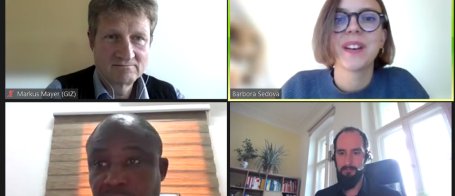Making Sense of Climate Data for Peacebuilding

The Berlin Climate Security Conference 2021 was held from 27 September to 8 October 2021 and featured several panel discussions and sessions on climate security from both a research and practitioners’ perspective. This discussion, hosted by PIK, was aimed at sharing and discussing PIK’s climate impact data to provide accessible climate information for comprehensive climate risk assessments and risk informed peacebuilding operations.
After a short introduction of the Weathering Risk initiative, its goals and the role of climate impact data for assessing climate-security risks by Barbora Sedova, project (co)-lead of the Weathering Risk Initiative, Professor Christoph Gornott, who at PIK leads the working group Adaptation in Agricultural Systems, introduced the AGRICA project. AGRICA provides climate risks analyses with estimates for current and projected climate and weather-related risks for a selected number of countries to support operational responses. Thereafter, Issa Lele a climate & resilience and an early warning specialist working for UNDP and Mali Meteo, and Markus Mayer, Head of Competence Center Peace and Emergency Aid at the GIZ, enriched the panel discussion with their practitioner’s perspectives.
Discussions evolved around questions on the contribution and suitability of AGRICA’s climate risk profiles to help inform climate-related security analysis for peacebuilding operations, as well as on gaps and barriers in climate information that prevail for assessing climate-related conflict risks. The panellists further emphasized the importance of enhanced collaboration and capacity-building activities to facilitate comprehensive climate-related peace and security risks assessments.
You can watch the video recording via this link: https://www.youtube.com/watch?v=jeQRo-K7j-k&t=4s
Share on

